Paul Starick: Vickie Chapman’s ousting has only worsened the Liberals’ gender woes | The State
Further humiliation awaits former deputy premier Vickie Chapman, whose ousting has created another major issue for Premier Steven Marshall, writes Paul Starick.
Opinion
Don't miss out on the headlines from Opinion. Followed categories will be added to My News.
Further humiliation awaits former deputy premier Vickie Chapman in coming days as her enemies prepare to deliver the ignominy of suspending her from sitting in parliament.
The torturous and labyrinthine process of her “standing down” as deputy premier and “stepping aside” from ministerial roles – as revealed by The Advertiser – is unlikely to spare her sanction from Labor and most crossbenchers.
The immediate effect will be to reduce Liberal numbers by one to 21, compared with Labor’s 19 and six crossbenchers, the latter including Speaker Dan Cregan.
The select committee investigating Ms Chapman’s rejection of a Kangaroo Island port recommended a nine-day suspension, based on three days’ punishment for each finding of misleading the house. There is no reason to believe the baying for Ms Chapman’s political blood among Labor and the crossbench has eased since the no-confidence motion against her was passed during the parliamentary mayhem of November 18.
“I think she’s toast next week. The mood is darkening on her. If she’d just taken it on the chin I reckon everyone would have moved on but it’s been the craziest non-resignation,” one MP told The Advertiser.
The tumultuous past seven weeks have been devastating for Premier Steven Marshall’s government, even if the state border reopening has been an effective smokescreen to obscure the effect among mainstream South Australians.
The most serious has been the loss of Ms Chapman as deputy premier – she was the first woman to hold that role. As deputy leader, her scalp is the most significant bar the premier’s. This political bloodsport excited a public interest for intrigue, rather than the conflict of interest and misconduct allegations probed by the select committee that was stacked against her.
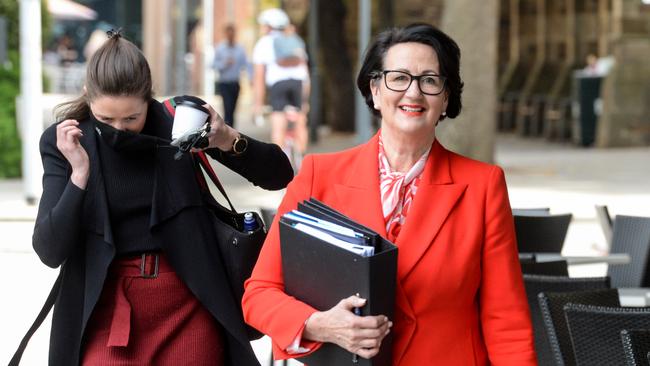
Ms Chapman’s awkward resignation and stepping aside process was hammered out on Sunday. It had the hallmarks of a strategy concocted by the artful political veteran Rob Lucas, then plotted with Mr Marshall over the pair’s regular Sunday morning coffee on The Parade at Norwood. But the toing and froing with Ms Chapman over the precise wording of a statement issued to The Advertiser on Sunday night clearly consumed the time that should have been spent working through details for Ms Chapman’s new pay arrangement, debate about which lingered for some days. There is still some confusion over whether her new backbencher’s salary is paid by the parliament or the Attorney-General’s Department.
The trigger for the government’s tumult was the October 8 defection of Dan Cregan from the Liberal Party to contest his blue-ribbon Adelaide Hills seat of Kavel as an independent. This transformed the parliament’s mood and numbers, as was devastatingly demonstrated just four days later when Mr Cregan was installed as Speaker in a stunning midnight coup. Hours beforehand, parliament had backed the inquiry into Ms Chapman’s refusal of the KI port.
The government has been unable to extricate itself from the Gordian knot tied by its inability to manage its partyroom. The consequences of losing MPs to the crossbench because of various scandals and disagreements are being acutely felt. Simmering factional tension, long suppressed under Mr Marshall’s reign, threatens to boil over.
Three parliamentary sitting days remain this year but there is some appetite among the crossbench to back Labor moves to sit in early February, possibly for six more days, in the weeks before the March 19 state election. Newly installed Deputy Premier Dan van Holst Pellekaan has been unable to contain this chaos. Managing parliament is his responsibility – he is leader of government business in the lower house.
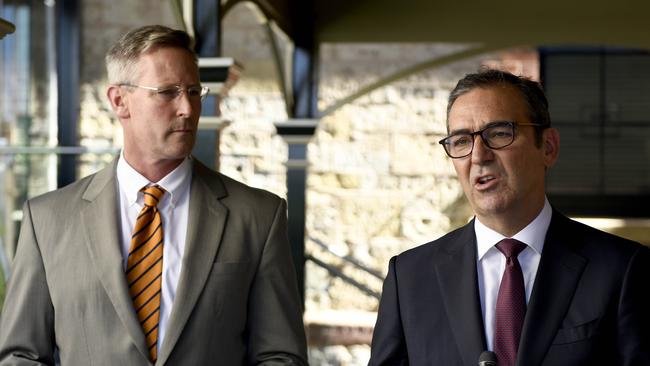
Some colleagues were scathing of the government’s bid to shut down parliament for five months from November 18, privately accusing Mr van Holst Pellekaan of bungling management of the crossbenchers. A week later, he was installed as deputy Liberal leader and Deputy Premier.
Ms Chapman stepping aside leaves the Liberals with just two women in cabinet – only one of these in the lower house, Child Protection Minister Rachel Sanderson. But she is under threat in her seat of Adelaide – the Liberals’ second-most marginal seat – and lacks Ms Chapman’s experience.
The loss of the state’s first female deputy premier was seized upon by Labor deputy leader Susan Close, who convincingly argued the Marshall cabinet’s gender balance “just doesn’t reflect the make-up of our society”.
The net effect is the destruction of the Liberal leadership team less than four months out from an election, forcing an unexpected transition that has left a gender imbalance at the highest levels of power.
How Marshall’s spin doctors planned double dose of chaos
By Paul Starick
Communication about letting Covid-19 into the state after border reopenings on Tuesday has been overtly used by Premier Steven Marshall to deflect from the parliamentary humiliation of his deputy, Vickie Chapman.
He has been stung severely, though, in both the details of the reopening procedures and the no-confidence motion in Ms Chapman passed during Thursday’s parliamentary mayhem.
Businesses are confused about the complexities of any cleaning and shutdown regimes if there are Covid-19 cases at their premises.
Those Test cricket patrons who had been eagerly anticipating a full house at Adelaide Oval for the Ashes match starting on December 16 have been flummoxed by the contradiction of a crowd limited to 35,000 patrons in a 53,500 capacity stadium – when only double-vaccinated people are permitted to enter. Given the Test will be just days before Christmas, many fans would have shared Prime Minister Scott Morrison’s sentiment that he’d like Australians to have their lives back for the festive season.
But the pandemic’s continued dominance of the news cycle, coupled with Tim Paine’s astonishing resignation as Australian cricket captain, has diverted public attention from Ms Chapman becoming the first minister in SA history to suffer the ignominy of a no-confidence motion.
In fact, the timetable for releasing vital information relating to the Covid-19 road map and border reopening procedures appears to have been designed to minimise public attention on Ms Chapman’s woes.
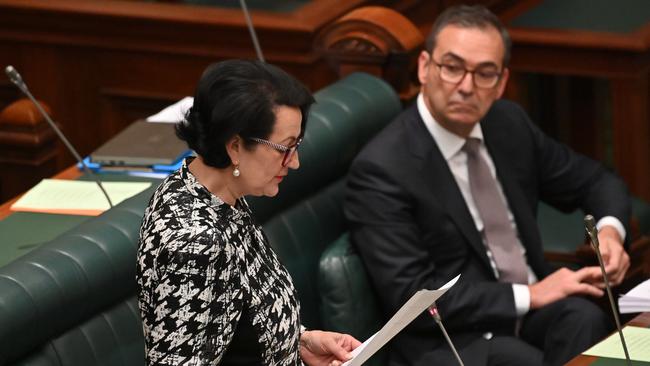
The first Covid-19 road map was released on October 26 – the day of parliament’s resumption after the sitting week in which Liberal defector Dan Cregan was installed in a midnight coup and a conflict of interest inquiry set up into Ms Chapman’s rejection of a Kangaroo Island port. This first road map revealed the state’s borders would reopen on November 23, when an 80 per cent double-dose vaccination target was expected to be hit.
The Chapman inquiry delivered a report, as scheduled, on Thursday morning, ahead of that afternoon’s passing of the no-confidence motion.
That followed Monday’s damning statements against Ms Chapman delivered by Dr Rachael Gray, QC, the counsel insisting the inquiry into the port development. Also on Monday, Mr Marshall was joined by Police Commissioner Grant Stevens and chief public health officer Professor Nicola Spurrier to deliver another road map, this time revealing a matrix of almost 30 scenarios to determine if people need to isolate when Covid-19 comes to SA. It also was announced that casual contacts would be spared quarantine when borders reopened and vaccinated close contacts would have to isolate for seven days. Business leaders declared it a “red tape nightmare”.
A daily drip feed of Covid-19 announcements followed, including a vaccine mandate for school teachers, staff and volunteers at government and private schools, along with early childhood providers.
On the day of the saga’s parliamentary crescendo, Thursday, the Adelaide Oval Test cricket vaccine mandate and capacity was revealed.
This overwhelmed the Chapman issue on news services in terms of editorial prominence. But there was significant interest in the parliamentary proceedings, indicating it had moved outside the purview of the chattering classes – even if only because of the general interest in a furious high-stakes stoush in the halls of state power.
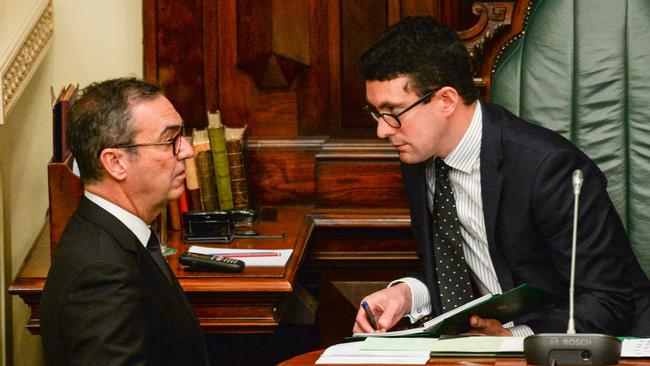
The Liberals had some pyrrhic victories on Thursday – removing Mr Marshall from the no-confidence motion and stripping Mr Cregan of the newly acquired powers to set parliamentary sitting dates.
But there was significant overreach in the latter, when manager of government business Dan van Holst Pellekaan moved to shut down parliament until May.
Liberals zealously backgrounded that this was precisely what former Labor premier Jay Weatherill had overseen in November, 2017, ahead of the 2018 election. The fact that Labor outrageously stifled parliamentary debate ahead of an election it lost does not justify the Liberals committing a similar affront to democracy.
This parliamentary putsch was defeated as former Liberal Sam Duluk switched back to Labor’s side after backing the push to strip Mr Cregan of his powers to set parliamentary sittings.
The question now turns to the future. Will Mr Marshall continue to stand resolutely by his deputy, to whom he has given his 100 per cent support? The calculation, thus far, has been that any political damage has been overshadowed by other issues grabbing the public attention – mostly Covid-19 – and this will continue in the short-term, before the issue dissipates ahead of the election. But any leader’s loyalty is eroded, perhaps fatally, by any prospect of losing an election.
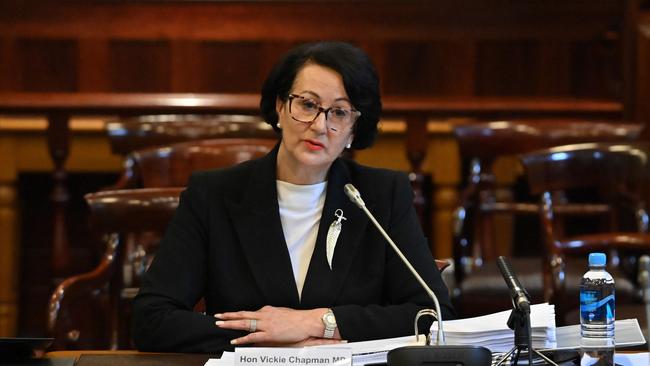
Deputy Premier’s future hangs on stacked MPs’ report
By Paul Starick
Friday, November, 12: Deputy Premier Vickie Chapman’s immediate political future is hanging on the potency of the report of a parliamentary inquiry that is loaded against her.
If this report has weighty and compelling evidence that she had a conflict of interest in rejecting a Kangaroo Island port, then there is the strong prospect of some of her Liberal enemies crossing the floor to back a bid to oust her from the ministry.
If it is a thinly veiled political assault, underpinned by flimsy evidence, then any no-confidence motion against Ms Chapman is unlikely to win support beyond Labor and an insufficient trio of crossbenchers.
Ms Chapman has launched a last-minute bid to derail the committee, with a legal attack on her chief inquisitor Tom Koutsantonis, and suspend further deliberations.
This has the potential to delay or scuttle the select committee or, at least, cast doubt about its legitimacy in the eyes of some MPs whose views will be highly influential in deciding Ms Chapman’s fate.
Crucially, Speaker Dan Cregan, a former solicitor, is likely to scrutinise the select committee’s report through both legal and political lenses.
Without damning evidence against Ms Chapman, Mr Cregan is highly unlikely to lend his crucial casting vote to any move to remove her from the ministry.
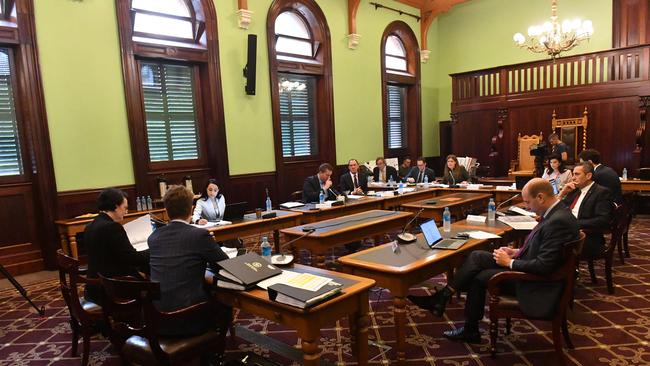
The stakes are high as the Select Committee on the Conduct of the Hon. Vickie Chapman MP regarding Kangaroo Island Port Application prepares to deliver its report on November 18. This is the last scheduled parliamentary sitting day before the March 19 election, even if there is a strong expectation that further sittings will be scheduled by Mr Cregan using the newly acquired powers of the Speaker.
Thus far, the committee hearings have galvanised political insiders and the commentariat but not produced a devastating smoking gun to blast Ms Chapman from ministerial office. The sting, however, is in the tail – the potential consequences.
This has been the fuel driving the interest in the committee’s deliberations.
As previously observed, the five-person select committee is comprised of two Labor MPs, two Liberals and former Liberal conservative turned crossbencher Sam Duluk.
Given Mr Duluk’s factional antipathy towards the Moderate faction’s Ms Chapman, the committee is stacked against the Deputy Premier. It is, therefore, reasonable to predict that this partisan majority will deliver a damning report and, as a result, Labor will engineer a no-confidence motion.
This is why the strength of the evidence in this report is critical. Mr Cregan and fellow former Liberal crossbencher, Mount Gambier MP Troy Bell, are unlikely to want to take the momentous step of ousting the Deputy Premier without compelling and iron-clad evidence.
Despite becoming independents, both will still want to maintain good relations, at the very least, with the Liberal Party. These would be irreparably torched if they backed a naked political hit job. Conversely, their independent credentials would be severely questioned if they did not act on overwhelming evidence.
There is lingering and significant enmity toward Ms Chapman from some within her own ranks, particularly among conservatives who were ideologically opposed to her spearheading euthanasia and abortion law reforms through the parliament earlier this year.
This opens up the prospect of Liberals crossing the floor – only in the event of a committee report that has watertight evidence damning Ms Chapman. It is worth remembering that Steve Murray, Nick McBride, Mr Cregan and Fraser Ellis crossed the floor in November, 2018, over mining reforms. Only two remain within the Liberal Party. Mr Ellis, whose move to the crossbench in February plunged the Liberals into minority government, wants to return to the fold.
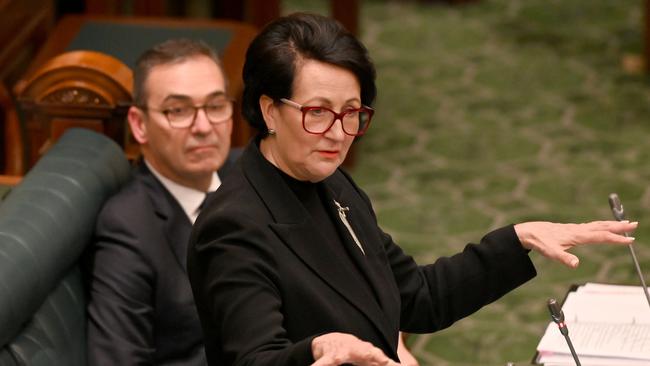
The Liberal state executive is considering letting Mr Ellis contest his blue-ribbon Yorke Peninsula seat without competition from his former party, possibly even allowing him to stand as a Liberal independent.
Effectively, this creates three scenarios. A report laden with weighty, damning evidence imperils Ms Chapman’s future as a minister.
A report laden with political rhetoric – without significant evidence – is likely to leave her opponents with insufficient numbers to fire her. Or the report might not be produced if legal action scuttles the committee.
Numbers in the house are fluid and likely dependent on the report – if it is issued.
The committee hearings might not be influencing voters but Premier Steven Marshall cannot afford to lose his deputy leader from the ministry through a parliamentary coup in the final sittings before an election.
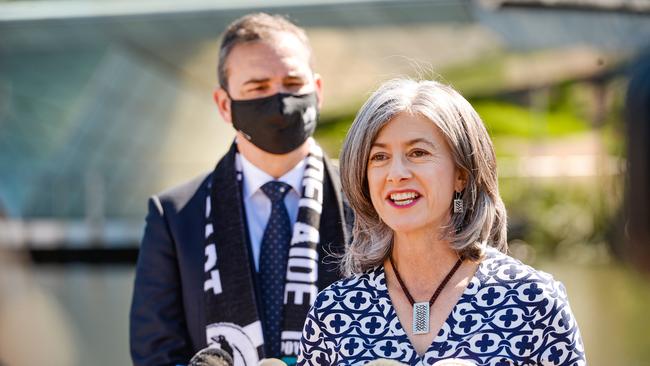
Why it’s a brave call to release Covid into SA
By Paul Starick
Friday, November 5: The Covid countdown has started. In less than two weeks, state borders will reopen, eventually letting in the deadly disease that has caused an unprecedented global shutdown and more than five million deaths.
Just 17 weeks before the March 19 state election, this is one of the most consequential decisions by any South Australian Premier.
Covid has defined Steven Marshall’s premiership and he is gambling his political future on overcoming the pandemic at the crucial final hurdles.
Labor might have been arguing Police Commissioner Grant Stevens and chief public health officer Professor Nicola Spurrier have been running the state during the pandemic. But the tune will change if the border dismantling backfires. Mr Marshall will own the reopening, for better or for worse, because the buck stops with the Premier, even when he has been relying upon expert advice. If Covid-19 ravages SA in the next few months, Mr Marshall’s opponents won’t be blaming Mr Stevens or Professor Spurrier – they will sheet the blame home to him.
As one senior Liberal said: “The election will be a referendum, or report card, on Marshall’s decision to open our economy and let Covid into South Australia. This is a totemic issue because the stakes are so high.”
Inarguably, there have been few, if any, better places on the planet to be during the pandemic than SA. Thus far, there have been 10 days of stay-at-home orders and four deaths.
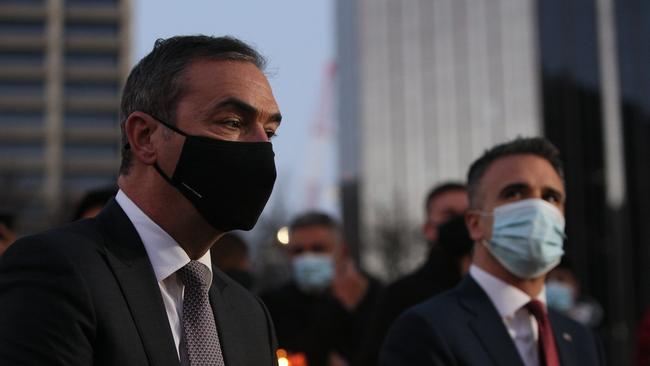
But, in AFL terms, the minor round is drawing to a close and the finals series is approaching. In recent years, both Crows and Power fans (Mr Marshall and his Labor rival Peter Malinauskas among the latter) have become bitterly aware of the pain of falling short in finals.
Under Mr Malinauskas, Labor has adopted a narrow-focus strategy, focused on health and education, particularly the former. Labor has stoked the flames kindled by unions representing ambulances, nurses and salaried medical officers, which have repeatedly argued the health system is struggling even without Covid-19.
If hospitals are overrun and chaos reigns in the community when Covid-19 is let into the state, the Liberals face political disaster. There is no doubt that it is a courageous move by a Premier to open up the state, both economically and socially, rather than turn SA into a hermit kingdom. Mr Marshall is relying on expert advice – a strategy that has served him well, thus far.
The expert advice is somewhat optimistic. Modelling underpinning the imminent border reopening, exclusively revealed by The Advertiser on Monday, shows the health system can more than cope with hospital admissions and a predicted 13 deaths across almost a year.
Both major party leaders will be hoping the forecast is correct. As the election nears, the contest is intensifying. Mr Malinauskas has been emboldened by the pressure being heaped upon his opponent within parliament – most notably Speaker Dan Cregan’s defection and a conflict of interest inquiry into Deputy Premier Vickie Chapman.
Behind the scenes, business leaders are being reassured that a Malinauskas government would be supportive and pro jobs and economic development.
Despite this, recapturing government after one term of opposition, during a global pandemic, is an extremely difficult task for Mr Malinauskas. He is well aware of the so-called sophomore surge, or first-term incumbency bonus, that incumbent candidates receive when running for their first re-election. Four of the Liberals’ five most-marginal seats are held by first-term MPs: Newland, King, Elder and Colton. Clearly, Labor needs to pick up some or most of these to win government, even if Kavel MP Mr Cregan’s defection to the crossbench left the Liberal minority government with 22 seats, just three more than Labor. As well as the marginals, Labor will target Transport Minister Corey Wingard’s southwestern Adelaide seat of Gibson and former Liberal state president Steve Murray’s southern Adelaide seat of Davenport.
The Liberals are confident that a boundaries redistribution effectively has handed them the upper Spencer Gulf seat of Frome and believe they can recapture Waite from independent Sam Duluk. This is a pathway to majority government with 24 seats. This discounts Kavel, Mount Gambier (Troy Bell) and Narungga (Fraser Ellis).
Both leaders are posturing that they will not cut deals with independents. “For us to continue to do our work, we need to have a majority Liberal government at the state election,” Mr Marshall told Mount Gambier’s The Border Watch on October 29. Mr Malinauskas will insist that only Labor can deliver majority government.
These platitudes will be discarded swiftly if there is no alternative to winning government. For that, the next few weeks will be a decisive, critical time.





